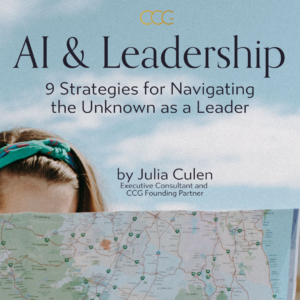Blog
Julia Culen
From Ego to Eco-System: leading in a new paradigm

more Blog Posts

Change (Management) is an Illusion. Here is why and what to do instead
Rather than being obsessed with change, focus on alignment. Resisting life by forcing yourself upon it will only lead to pain, drama, and failure. Being aligned, on the other hand, will bring you peace of mind, deep satisfaction, and effortless success.

AI & Leadership 9 Strategies for Navigating the Unknown as a Leader
In our approach “Conscious” is nothing weird, esoteric or mystic: rather, it signifies being fully aware, awake, and accountable—taking ownership of our choices and living and working with purpose, intention, and clarity. It’s about acting with mindfulness and intentionality, rather than reacting habitually or driven by unconscious patterns.

What is the meaning of “conscious”?
In our approach “Conscious” is nothing weird, esoteric or mystic: rather, it signifies being fully aware, awake, and accountable—taking ownership of our choices and living and working with purpose, intention, and clarity. It’s about acting with mindfulness and intentionality, rather than reacting habitually or driven by unconscious patterns.
- From an attitude of “getting the largest slice of the cake” to “growing the cake together”: this is true for intra as well as inter company networks and ecosystems
- From competition to co-creation: in an ecosystem leadership is not about making distinctions between friends and enemies, but exploring new possibilities with competitors
- From exploitation to a balance of give and take: squeezing out margins and dumping prices hurts your partners first and then yourself. This is a system as boomerang: for better or worse, everything comes back to you – but you have no way of knowing when and how
- From pressure to purpose: rather than creating pressure for results, leaders create a pull by a shared purpose, to which people, partners and network actors will be motivated to contribute
- From controlling actions to creating beneficial conditions: Instead of directing by command-and-control, leaders of ecosystems create the conditions or context for action: clear intention, sufficient resources and an empowering work atmosphere that allows for trust, creativity and energetic action
- From linear thinking to systems thinking: Linear thinking works in a world of of direct input-output relations, but not in ecosystems, that are organisms rather than programmable machines. They are constantly changing their state, and everything is the cause for everything. Rather than business school teachings, leaders can learn from disciplines like systems thinking, cybernetics, constructivism and wisdom tradition how to powerfully navigate complex living systems.
- From fire-fighting to pattern recognition: Rather than fixing problems as they occur, leaders learn to look deeper into the situation, recognizing and addressing recurring dysfunctional patterns
- From limitation of the thinking mind it all to cultivating human potential: Navigating the unknown and unknowable requires the full human potential. Empathy, emotional intelligence and intuition are to be cultivated in addition to the rational mind.
